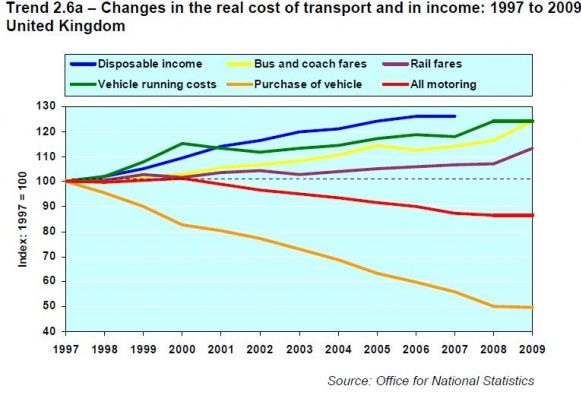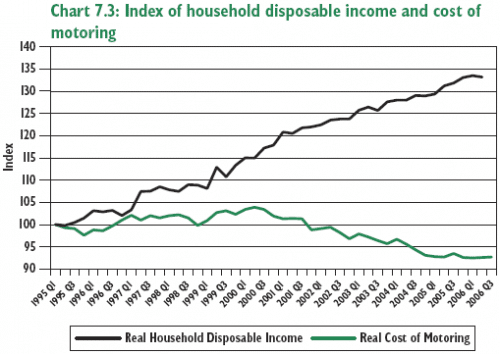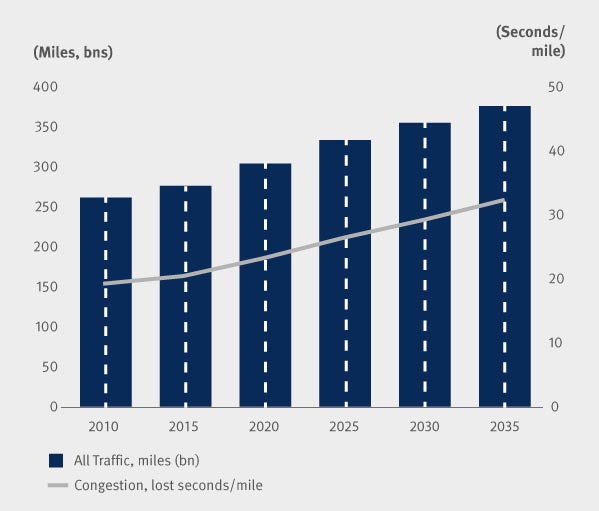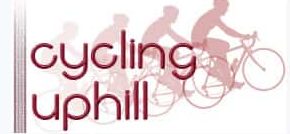
Other the past two decades, the real cost of motoring has fallen. Despite increases in petrol tax, motoring is getting cheaper – whilst other forms of transport, bus and train have been increasing faster than inflation. With the political popularity of freezing petrol tax, we are likely to see motoring continue to be relatively cheaper. But, although cheaper motoring seems attractive, the drawback is that it will contribute to a marked rise in congestion and very different costs to motorists and society.
Even a study by the RAC also shows that the real cost of motoring has fallen. – Even though you frequently hear about hard pressed motorists.
Cost of travel since 1988.

Spot the hard pressed motorist.

The RAC state:
- 28% cheaper to buy and run a car, excluding fuel costs, in 2008 than 1988. (RAC)
- However, motorists do pay £45bn in fuel duty, VAT, new car tax and the road fund licence.

Petrol Tax
Compared to other countries, petrol tax is high in the UK, though the UK also has the highest rates of congestion in Europe. In recent years, the government have taken the popular decision to freeze petrol tax, and it is becoming politically difficult to increase petrol tax or even to consider road pricing.
The problem with freezing petrol tax is that we are likely to see a big rise in congestion over the next few years. As the economy recovers from the recession, people will increasingly take the car, and because driving is cheap – avoid alternatives such as walking, cycling or public transport.
Another feature is that the fuel efficiency of engines are increasingly significantly. This is good from an environmental perspective and also from an efficiency perspective. However, what it means is that the government will see a fall in tax revenue from petrol excise duty as people use less fuel. It will mean that if fuel duty is continued to be kept the same, the amount we pay in fuel duty will decline because we are using less petrol to go further; the real costs of motoring will fall even more.

This might seem good news for motorists, but the price of car use is complicated. Given limited road space, cheaper motoring increases congestion and causes a different type of cost to motorists – i.e. sitting in a traffic jam.
The CBI estimate that traffic congestion costs the UK economy £20 billion a year.See cost of congestion
Conclusion
There’s no such thing as a free meal, there’s also no such thing as ‘cheap motoring’. If the real cost of motoring falls, it causes other social costs – pollution, congestion and also contributes to making the nation less healthy because we would rather drive than walk or cycle. (Recent stats show a decline in cycle use, last year)
I drive about 10,000 miles a year – I pay a lot of petrol tax. An increase in petrol tax would leave me with less disposable income. But, I would still support an increase in petrol tax because
- Higher petrol tax enables other forms of tax (income, VAT) to be less than it would have been.

- Driving causes significant external costs to society – pollution, congestion and accidents. It is more socially efficient for motorists to pay the true social cost of driving.
I do believe that the government should be discouraging car journeys , especially where there are much better alternatives, such as walking or cycling The quality of life in cities would be vastly improved if we could reduce the dominance of the car. And higher petrol tax is a price I would be very happy to pay.
But, I doubt it. Helped by newspapers, the motoring lobby is powerful. Cutting petrol tax is popular; and in the UK popularist, short-term policies seems to be in vogue at the moment. But, if we freeze petrol tax and don’t build more public transport, don’t blame the government when you’re stuck in a traffic jam.

here, here.
penultimate para, should, I think, say: “such as walking or cycling.”
yes, thanks